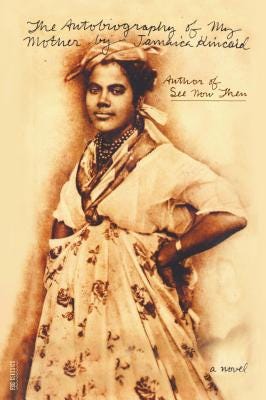'The Autobiography of My Mother': Caribbean fiction
Jamaica Kincaid tells the story of a quietly subversive life.
This post contains an affiliate link or links. If you use a link to buy a book, I may earn a small commission. You can find all the books that have been featured in this newsletter in my Bookshop store.
This week I’m back to my effort to read more globally with a literary visit to the Caribbean island of Antigua, birthplace of Jamaica Kincaid. I knew her name but had not read any of her work, so I picked the first one available from the library: “The Autobiography of My Mother.”
The author’s Encyclopedia Britannica entry describes this 1996 novel as representing at a “fever pitch” the author’s treatment of the themes of “family relationships, personhood, and the taint of colonialism.” Kincaid sets a Dickensian tone from the opening sentence introducing her narrator, Xuela:
My mother died at the moment I was born, and so for my whole life there was nothing standing between myself and eternity; at my back was always a bleak, bleak wind.
Though I say “Dickensian,” the comparison this novel evoked for me was with Charlotte Bronte’s “Jane Eyre,” a book I first read as a child. (My father had a tendency to thrust one 19th-century English classic or another into my hands with a comment along the lines of, “This book is about a kid, you’ll like it,” resulting in my struggling for the next week to parse “Jane Eyre” or “Oliver Twist” or “David Copperfield.”)
Like Jane, Xuela is wanted by no one, though she has a living father; like Jane, she responds by growing a hard shell of self-reliance. Xuela dwells on the importance of close ties to others, how being observed creates “an invisible current” between the observed and the observer, and how living unseen can affect one’s personhood:
I believe that no life is complete, no life is really whole, without this invisible current, which is in many ways a definition of love. No one observed and beheld me, I observed and beheld myself; the invisible current went out and it came back to me. I came to love myself in defiance, out of despair, because there was nothing else.
Jane’s life even has an echo of Xuela’s native Caribbean, via the secret Mrs. Rochester. But Bronte’s Caribbean is someone else’s faraway nightmare. Kincaid envelops the senses in loving detail:
… there was the green of the leaves, the red burst of the flowers from the flamboyant trees, the sickly yellow fruit of the cashew, the smell of lime, the smell of almonds, the coffee on my breath …
… I could see the reflection of the sun’s light on the surface of the seawater, and it always had the quality of an expectation just about to be fulfilled, as if any moment a small city made out of that special light of the sun on the water would arise, and from it might flow a joy I had not yet imagined.
This sensuality carries over into how Xuela conducts her life. She is eager for men, who can satisfy her physical desires, and not at all eager for a child, who might stymie them. She remains resolutely alone in that regard, until she has reached the stage of life where she is now facing into that bleak, bleak wind from the novel’s opening.
Speaking of mothers: In a 2005 article in the Journal of Caribbean Literature, Louis Simon wrote that the logic-defying title of “The Autobiography of My Mother” embodies a contradiction that “signals a subversion of language.” And not just language. Xuela relishes small subversions like refusing to wear undergarments. In the former British colony of Antigua, she delights in the Afro-Carib heritage that darkens her skin in comparison to that of her father, a red-headed, gray-eyed son of a Scotsman. He is a policeman, charged with keeping order; Xuela undermines order, running away from home, starting affairs with married men, and generally daring to live on her own terms.



I loved this book when I read it a decade ago and your memory of having Jane Eyre "thrust" at you b your father made me laugh. Mine gave it to me more gently when I was 10 and sick in bed with a cold. He inscribed it, for Martha and please don't be too scared. I too was reminded of Jane Eyre when I read the Autobiography of my Mother. My friend Rosellen Brown titled either her first or second novel The Autobiog. of My Mother, incidentally, culturally a very different milieu and story, about some very strong Jewish women. Thanks for this post; it brings back some fine memories.